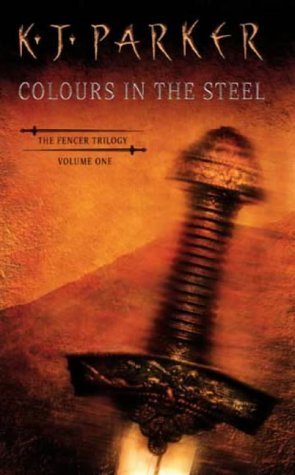What do you think?
Rate this book


503 pages, Mass Market Paperback
First published June 4, 1998
“The clerks of Perimadeia had decided that the end was probably nigh, in which case they might as well indulge themselves while they still had money and their money was still worth something; and if it wasn’t the end of the world, they had cause for celebration, best effected by buying things.”And I loved how Parker defied our expectations. For example, take the "savage" clansmen. We know that the plainspeople are identifiable by appearance alone, but the particulars are only mentioned once, in passing: they are slighter and fairer than the cityfolk. (Take that, Martin! Plus, it fits neatly into the sense of Perimandeia as Rome and the plainspeople as Celtic warriors.)
"She was supposed to come straight back here, and that was four hours ago. By now, she’s either dead or shopping."
“Contrary to popular belief the official doctors didn’t kill quite as many people as the lawyers did, though not for want of trying.”
"They were like two men shipwrecked on an entirely unknown continent; everything they came across was new and unknown, which they could spend a lifetime studying if they weren’t so entirely preoccupied with staying alive and somehow getting home again."
"I’m starting to get the enemy and the auditors muddled up in my mind. I’m terrified of both of them, but the auditors know where I live."However, despite all of the tongue-in-cheek wit and wordplay, I realized that I won't be picking up the next book. All of the protagonists are antiheroes to some extent, and almost all of their misery is self-inflicted. They fall into the same traps again and again, with the inevitability of a Greek tragedy. There is no ultimate evil here; there are only people who hold grudges and misjudge each other and get everyone else around them killed. Parker’s portrait of war is not glorious or heroic or pulse-racing; it’s occasionally horrific, sometimes technical and boring, but always ugly, and always sad. This didn’t precisely surprise me. I’ve encountered quite a few of Parker’s short stories, and every single one was a vehement protest of war and all its trappings.
“Put the steel into the fire and watch it change colour; straw to orange to brown to purple to blue to green to black. According to some smiths he’d talked to, there’s a certain point at which something happens to heated steel. Make it hot enough and the flexibility changes to cutting hardness, at which point the skill lies in tempering it, quenching the heat with skill and care in such a way that the steel stays hard without becoming brittle. It’s a delicate business, the perfect balance of fire and water; although there are some smiths who prefer to temper in some kind of oil, and others who use blood. Blood, they say, puts something into the steel at that crucial moment of tempering, an extra touch of hardness on the outside of the metal that doesn’t affect the flexibility and resilience of the core.”I love Parker’s imagination, xyr ability to create characters who breathe, who are so filled with that paradoxical mixture of flawed humanity that I can ache for them and be disgusted by them in turns. Above all, I love xyr humour. And even if I won’t be continuing in this series, I will be trying Parker's books again.


"... service is what makes you stand in the line [of battle] when nobody would try and stop you, if you ran away, and honour is what's left when every other conceivable reason for staying there has long since evaporated."